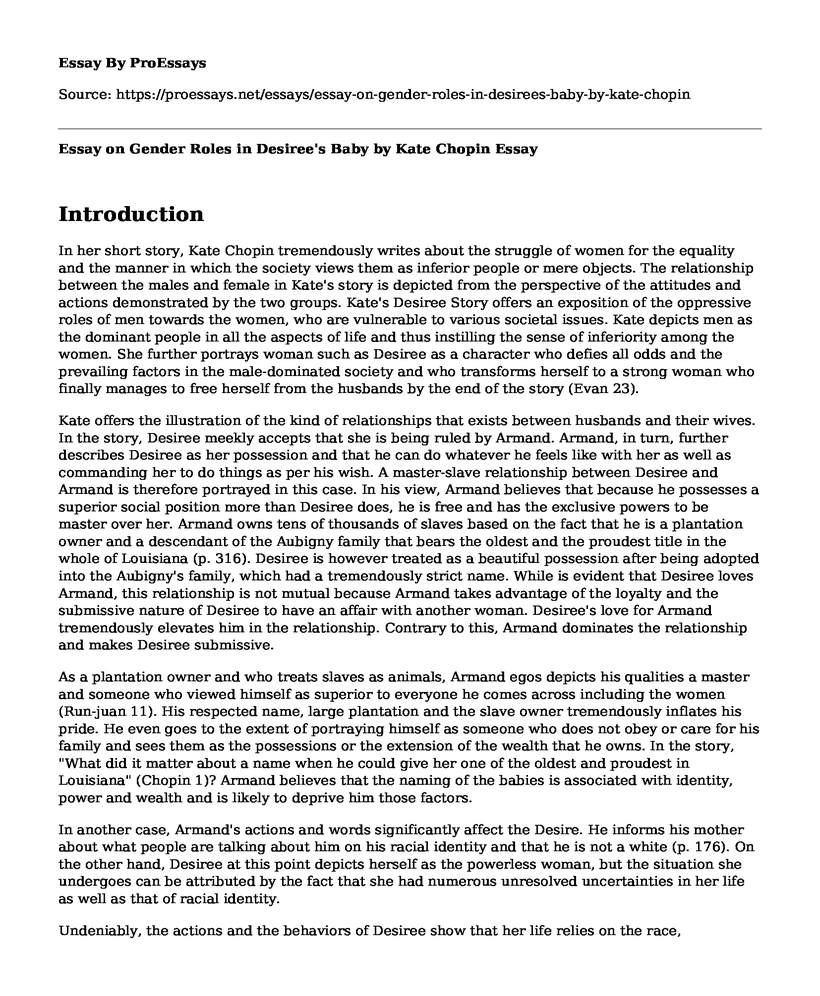Introduction
In her short story, Kate Chopin tremendously writes about the struggle of women for the equality and the manner in which the society views them as inferior people or mere objects. The relationship between the males and female in Kate's story is depicted from the perspective of the attitudes and actions demonstrated by the two groups. Kate's Desiree Story offers an exposition of the oppressive roles of men towards the women, who are vulnerable to various societal issues. Kate depicts men as the dominant people in all the aspects of life and thus instilling the sense of inferiority among the women. She further portrays woman such as Desiree as a character who defies all odds and the prevailing factors in the male-dominated society and who transforms herself to a strong woman who finally manages to free herself from the husbands by the end of the story (Evan 23).
Kate offers the illustration of the kind of relationships that exists between husbands and their wives. In the story, Desiree meekly accepts that she is being ruled by Armand. Armand, in turn, further describes Desiree as her possession and that he can do whatever he feels like with her as well as commanding her to do things as per his wish. A master-slave relationship between Desiree and Armand is therefore portrayed in this case. In his view, Armand believes that because he possesses a superior social position more than Desiree does, he is free and has the exclusive powers to be master over her. Armand owns tens of thousands of slaves based on the fact that he is a plantation owner and a descendant of the Aubigny family that bears the oldest and the proudest title in the whole of Louisiana (p. 316). Desiree is however treated as a beautiful possession after being adopted into the Aubigny's family, which had a tremendously strict name. While is evident that Desiree loves Armand, this relationship is not mutual because Armand takes advantage of the loyalty and the submissive nature of Desiree to have an affair with another woman. Desiree's love for Armand tremendously elevates him in the relationship. Contrary to this, Armand dominates the relationship and makes Desiree submissive.
As a plantation owner and who treats slaves as animals, Armand egos depicts his qualities a master and someone who viewed himself as superior to everyone he comes across including the women (Run-juan 11). His respected name, large plantation and the slave owner tremendously inflates his pride. He even goes to the extent of portraying himself as someone who does not obey or care for his family and sees them as the possessions or the extension of the wealth that he owns. In the story, "What did it matter about a name when he could give her one of the oldest and proudest in Louisiana" (Chopin 1)? Armand believes that the naming of the babies is associated with identity, power and wealth and is likely to deprive him those factors.
In another case, Armand's actions and words significantly affect the Desire. He informs his mother about what people are talking about him on his racial identity and that he is not a white (p. 176). On the other hand, Desiree at this point depicts herself as the powerless woman, but the situation she undergoes can be attributed by the fact that she had numerous unresolved uncertainties in her life as well as that of racial identity.
Undeniably, the actions and the behaviors of Desiree show that her life relies on the race, perceptions and Armand's social class. In fact, she feels compelled to obey every little command or rules given by Armand. In this case, therefore, Kate portrays Desire as a vulnerable and who follows anything that Armand is telling them. Towards the end of the book, she achieves personal freedom and independence from Armand. She becomes strong and escapes through the reeds that grew along the banks. For Armand, however, being a male who holds power could also constitute blackness. Ultimately, Desiree feels being forced to leave with the aim of pleasing him. The decisions to decide to kill herself together with the child but notices that her insensitivity plays the crucial role in contributing to her vulnerability.
Conclusion
In conclusion, Kate Chopin has played a crucial role in addressing the gender roles in the story. Specifically, she shows the nature of the relationships that exist between the men and women in the book. Both Armand and Desiree are in a relationship but lacks mutuality in it as one party dominates the other, thus making the other one submissive. In fact, his move to describe Desiree as her possession and that he can do whatever he feels like with her as well as command her to do things as per his wish exposes his egocentric character. Chopin portrays female as weak, but they transform to free themselves from the male-dominated society to become independent.
Works Cited
Evans, Robert C., ed. Kate Chopin's short fiction: a critical companion. Locust Hill Press, 2001.
Run-juan, W. "A Parody Interpretation of Desiree's Baby by Kate Chopin." Journal of Xi'an University of Arts and Science (Social Sciences Edition) 6 (2011): 011.
Cite this page
Essay on Gender Roles in Desiree's Baby by Kate Chopin. (2022, May 16). Retrieved from https://proessays.net/essays/essay-on-gender-roles-in-desirees-baby-by-kate-chopin
If you are the original author of this essay and no longer wish to have it published on the ProEssays website, please click below to request its removal:
- Destructive Communication Essay
- Chinese Mythology Essay Example
- Essay Sample on Inaccurate Representations of Minorities in U.S. Films
- Love & Folly in Shakespeare's Twelfth Night - Essay Sample
- Essay Sample on The Ballad of Birmingham: Revealing Injustices of 1969 Church Bombings
- Essay Example on Stereotypes: Impact on Self-Concept in Ingroup Experts & Peers
- Achieving Optimal Communication: Sweet Rocks Corp's Checklist - Essay Sample







